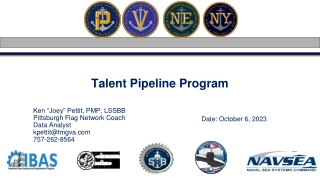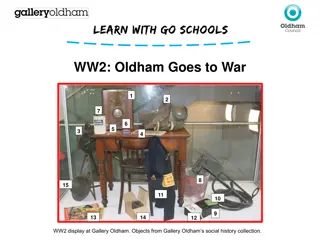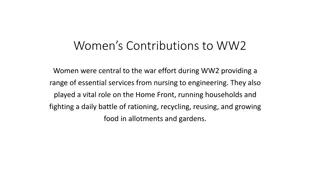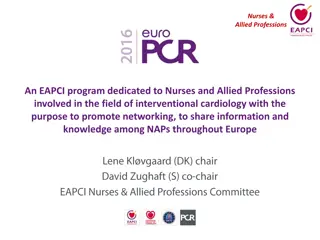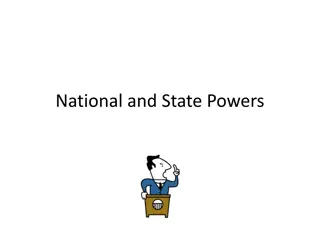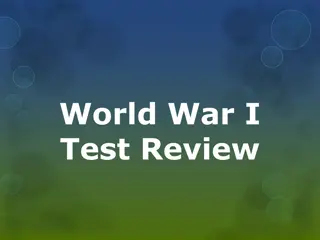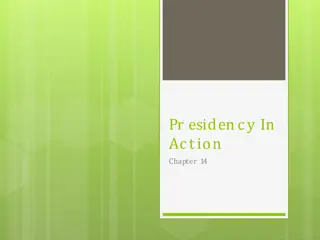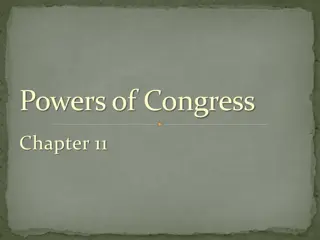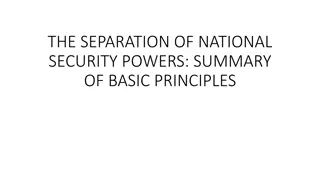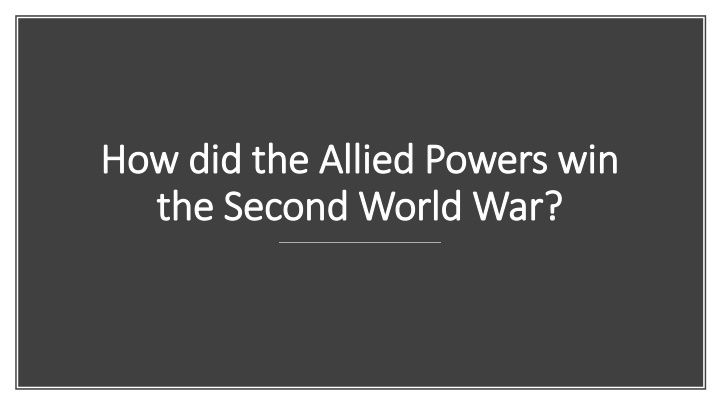
Allied Powers' Victories in the Second World War: Key Turning Points
Explore how the Allied Powers secured victory in the Second World War through significant turning points like Churchill's decision in 1940, events of December 1941, and the psychological impact of Stalingrad. Learn about different interpretations from historians like Sir Anthony Beevor and Professor Tsuyoshi Hasegawa.
Download Presentation

Please find below an Image/Link to download the presentation.
The content on the website is provided AS IS for your information and personal use only. It may not be sold, licensed, or shared on other websites without obtaining consent from the author. If you encounter any issues during the download, it is possible that the publisher has removed the file from their server.
You are allowed to download the files provided on this website for personal or commercial use, subject to the condition that they are used lawfully. All files are the property of their respective owners.
The content on the website is provided AS IS for your information and personal use only. It may not be sold, licensed, or shared on other websites without obtaining consent from the author.
E N D
Presentation Transcript
How did the Allied Powers win How did the Allied Powers win the Second World War? the Second World War?
When was the War won? When was the War won?
Signing of the instrument of Japanese surrender September 2nd1945
The blue areas were under German government control in May 1945
Axis ??? VS Powers and their allies Who were the Allied Powers? Who were the Allied Powers?
Axis power Axis power occupation occupation and influence and influence in 1942 in 1942
How did the Allied Powers win How did the Allied Powers win the Second World War? the Second World War?
Interpretation One: Sir Anthony Interpretation One: Sir Anthony Beevor military historian military historian Beevor, British , British There are three major turning points in the war and they re all different in their own particular way. The first one is a negative one and that was Churchill s decision to fight on in May 1940. If we hadn t had that then there would never have been a base for the Americans to fight back, and there is always the possibility that Hitler could have maintained a complete hegemony over Western Europe. The second and probably the great geopolitical turning point was December 1941, as both the Germans were checked in front of Moscow and the Americans entered into the war. The third is the psychological turning point which is Stalingrad, though it wasn t necessarily the military turning point except in the fact that it gave the Red Army the confidence, and the techniques that it really needed, to go on beating the Germans. But it was the psychological turning point as far as the rest of the world was concerned, even in Western Europe, even in South America, throughout the world - Stalingrad became a huge symbol.
Interpretation Two: Professor Tsuyoshi Interpretation Two: Professor Tsuyoshi Hasegawa, University of California. Hasegawa, University of California. The Hiroshima bomb did not make the Japanese ruling elite feel as though their backs were to the wall. It inflicted a serious body blow, but it was hardly a knock-out punch. So says eminent historian Tsuyoshi Hasegawa. He and other dissenting voices believe that the real reason Japan surrendered was Soviet dictator Joseph Stalin. The Soviet Union and Japan had in fact signed a neutrality pact back in 1941, which served both their interests nicely. The Soviets could focus on taking on the Nazis without worrying about being attacked on the other side by Japan, while the Japanese were free to concentrate on their brutal battles with the US. Things only changed on 9 August [1945], the very day of the second atomic attack on Nagasaki, when the Soviets suddenly broke the pact, mounting a massive invasion of Japan s territories that decimated Japanese troops. Hiroshima had happened days before, but it was only now that the Japanese leaders fell into a panic. As historian Tsuyoshi Hasegawa puts it, The Soviet entry into the war played a much greater role than the atomic bombs in inducing Japan to surrender because it dashed any hope that Japan could terminate the war through Moscow's mediation.
Interpretation Three: Professor Mary Interpretation Three: Professor Mary Barbier Mississippi State University. Mississippi State University. Barbier, , The single greatest factor in the Allied victory over Nazi Germany and its allies in Europe was the role that Adolf Hitler played in determining the offensives launched by the German military. On multiple occasions, Hitler s decision making was flawed. Hitler frequently ignored the recommendations of his advisors, and ordered major operations that ultimately had enormous consequences and affected Germany s ability to achieve final victory. Hitler gave the green light to the invasion of the USSR on 20 June 1941, and the German invasion commenced two days later. Despite initial successes all along the front, the operation ground to a halt within months. Instead of easily defeating the Soviets, as predicted, the Germans woke a sleeping bear that refused to be budged from either Moscow or Stalingrad. Thousands of German soldiers surrendered or died while fighting in Moscow, Leningrad and Stalin grad. Like a meat grinder, the war in the east consumed millions of men. On 11 December, Hitler joined Mussolini in declaring war on the United States even though the Soviet Union had not yet been defeated Not willing to throw in the towel, Hitler authorised the Reich s final counteroffensive in the west, Operation Autumn Mist known as the battle of the Bulge which also ended in defeat, and was the final nail in the coffin. Germany no longer had the chance of a victorious outcome. Although the Soviet, British, American and Canadian armies together defeated Germany, Hitler s flawed decision-making played a significant role in the Allied victory in Europe.
Turning point moments are those that Turning point moments are those that Retain / take territory that could be used to military advantage in the future. Brought greater military and economic power to the Allied Powers. Were psychological and damaged Axis Powers morale and/or gave confidence to the Allied Powers. Meant that the Axis Powers would have to fight on more fronts. Allied Powers were able to learn from and build on to improve their tactics. Provided more opportunities to build Allied Power military alliances.
Your task: Your task: Use the criteria to decide the key moments which led to the Allied Powers victory in 1945.



